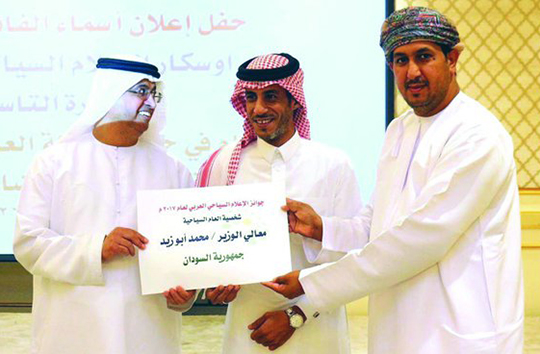Jeddah, Jan 29: Several Saudi personalities and journalists gathered Thursday at the Arab Tourism Media Awards announcement ceremony 2017 at Casablanca Grand Hotel Jeddah.

Among the attendees of the program were Hussain Al-Mannai, chairman of the Arab Center for Tourism Media; Ahmed Al-Juaed, board member of Saudi Tour Guides Association; Fahad A. Al-Ghamdi, executive chairman of Al Mada advertising, Sultan Al-Yahyaie, chairman of the Oman Center for Tourism Media, and Khalid Al-Khalil, Sabq Tourist supervisor.
The Arab Heritage Man for the year went to Abdulaziz bin Mohammed Al-Rawas, counselor of Cultural Affairs to Sultan Qaboos bin Said of Oman. The Heritage Personality of the Year Award went to Mohammed Abu Zaid Mustafa, minister of Tourism, Antiquities and Wildlife for the Republic of Sudan.
Khalid Al-Sulaiti general manager of Katara cultural village from Qatar, won the title of the Best Government Personality in Supporting Arab Tourism. Mehdi Al-Abduwani of Oman won the award for Leading Personality in Tourism.
Saudi Arabia captured four regional tourism awards. Best Tourist Snapshot was won for a photograph of Taif. The Best Tourism Writer was won by Saudi journalist Ahmed Awad Sulais of Al-Jazirah newspaper and Essam Taboni from Libya.
Nayef Anzi of Saudi Arabia won the award for Best Director of the Year for Public Relations in the Tourism Sector. The Best Tourist Instagram award went to the Saudi Tourism Instagram accounts of Sami Tokhees and Hisham Hamid.
The awards included about 28 media categories specializing in the field of tourism. The contest saw a large turnout through the electronic voting.
Almost 900,000 people participated in voting for 260 participants from all the Arab countries. The Saudi winners were among several Arab contenders in various categories, including entrants from Oman, Kuwait, Egypt, Bahrain, Sudan, Algeria, Morocco, the United Arab Emirates (UAE), Tunisia and Jordan.





Comments
Add new comment